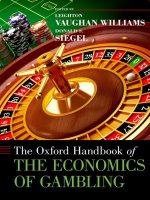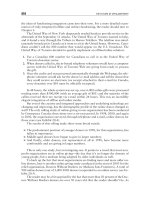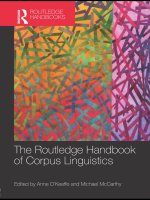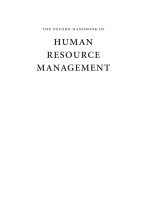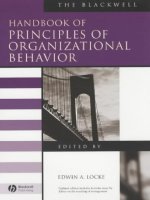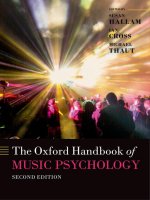The routledge handbook of festivals
Bạn đang xem bản rút gọn của tài liệu. Xem và tải ngay bản đầy đủ của tài liệu tại đây (7.35 MB, 451 trang )
The Routledge Handbook
of Festivals
In recent times, festivals around the world have grown in number due to the increased recognition of their importance for tourism, branding and economic development. Festivals
hold multifaceted roles in society and can be staged to bring positive economic impact, for
the competitive advantage they lend a destination or to address social objectives. Studies on
festivals have appeared in a wide range of disciplines, and consequently, much of the research
available is highly fragmented.
This handbook brings this knowledge together in one volume, offering a comprehensive
evaluation of the most current research, debates and controversies surrounding festivals. It is
divided into nine sections that cover a wide range of theories, concepts and contexts, such
as sustainability, festival marketing and management, the strategic use of festivals and their
future.
Featuring a variety of disciplinary, cultural and national perspectives from an international team of authors, this book will be an invaluable resource for students and researchers
of event management and will be of interest to scholars in the fields of anthropology, sociology, geography, marketing, management, psychology and economics.
Judith Mair is an Associate Professor in the Tourism Discipline Group of the UQ Business
School, University of Queensland, Australia.
The Routledge
Handbook of Festivals
Edited by Judith Mair
First published 2019
by Routledge
2 Park Square, Milton Park, Abingdon, Oxon OX14 4RN
and by Routledge
711 Third Avenue, New York, NY 10017
Routledge is an imprint of the Taylor & Francis Group, an informa business
© 2019 selection and editorial matter, Judith Mair; individual chapters,
the contributors
The right of Judith Mair to be identified as the author of the editorial
material, and of the authors for their individual chapters, has been
asserted in accordance with sections 77 and 78 of the Copyright, Designs
and Patents Act 1988.
All rights reserved. No part of this book may be reprinted or reproduced
or utilised in any form or by any electronic, mechanical, or other
means, now known or hereafter invented, including photocopying and
recording, or in any information storage or retrieval system, without
permission in writing from the publishers.
Trademark notice: Product or corporate names may be trademarks
or registered trademarks, and are used only for identification and
explanation without intent to infringe.
British Library Cataloguing-in-Publication Data
A catalogue record for this book is available from the British Library
Library of Congress Cataloging-in-Publication Data
A catalog record has been requested for this book
ISBN: 978-1-138-73581-1 (hbk)
ISBN: 978-1-315-18632-0 (ebk)
Typeset in Bembo
by codeMantra
Contents
Lists of figuresx
List of tablesxi
List of contributorsxii
Part I
Introduction1
1 Introduction3
Judith Mair
2 Methodological approaches to festival research12
Mary Beth Gouthro and Dorothy Fox
3 The value of festivals22
Donald Getz, Tommy D. Andersson, John Armbrecht and Erik Lundberg
4 The meaning of festivals: reconfiguring the semiotic approach31
Xiaoming Zhang
Part II
Sustainability41
5 Valuing the impacts of festivals43
Larry Dwyer and Leo Jago
6 Festivals and social sustainability53
Bernadette Quinn
v
Contents
7 Evaluating the sociocultural effects of festivals: developing a
comprehensive impact correlation model and its application62
Ronnit Wilmersdörffer and Daniela Schlicher
8 Influencers of environmental sustainability success at festivals71
Meegan Jones
Part III
Festival management81
9 Managing festival volunteers: the HELPERS model83
Kirsten Holmes, Leonie Lockstone-Binney, Karen A. Smith
and Alex Rixon-Booth
10 The role of harm minimisation to prevent alcohol and drug
misuse at outdoor music festivals92
Alison Hutton
11 Social media and the transformation of the festival industry:
a typology of festivals and the formation of new markets102
Marianna Sigala
12 The innovation of arts festivals: concepts, approaches and effects111
Weibing (Max) Zhao and Weng Si (Clara) Lei
13 Managing networks of meaning in arts festival productions120
Mervi Luonila
Part IV
Festival marketing131
14 Festivals and sponsorship: a strategic marketing approach133
Gurhan Aktas and Z. Gokce Sel
15 Festivals’ role in branding a destination: a case study of the
Barbaros Strawman Festival in İzmir, Turkey142
Reyhan Arslan Ayazlar
16 Branding cultural events using external reference points:
Cervantes and the Festival Internacional Cervantino, Mexico152
Daniel Barrera-Fernández, Marco Hernández-Escampa
and Antonia Balbuena Vázquez
vi
Contents
17 Festivals and social media: a co-created transformation of attendees
and organisers163
Marianna Sigala
Part v
Strategic use of festivals173
18 Leveraging a festival to build bridges in a divided city175
Adrian Devine, Bernadette Quinn and Frances Devine
19 Extending the exit brand: from Serbia’s fortress to
Montenegro’s coast185
Nicholas Wise, Tanja Armenski and Nemanja Davidović
20 The eventful city in a complex economic, social and political
environment: the case of Macau194
Ubaldino Sequeira Couto
21 Protesting @ Auckland Pride: when a community stakeholder
becomes alienated204
Jared Mackley-Crump
22 Festivals as devices for enhancing social connectivity and the
resilience of rural communities214
Michael Mackay, Joanna Fountain and Nicholas Cradock-Henry
23 Geelong’s rousing motoring ‘Revival’223
Gary Best
Part vi
Festival experiences233
24 Understanding feelings, barriers, and conflicts in festivals and events:
the impact upon family QOL235
Raphaela Stadler and Allan Jepson
25 Festivity and attendee experience: a confessional tale of discovery244
Vern Biaett
26 Information and communication technology and the festival experience254
Christine M. Van Winkle, Kelly J. Mackay and Elizabeth Halpenny
vii
Contents
27 How do residents experience their own festivals? A qualitative
approach to meanings and experiences263
Nídia Brás, Júlio Mendes, Manuela Guerreiro and
Bernardete Dias Sequeira
28 Feminist politics in the festival space273
Tasmin Coyle and Louise Platt
Part vii
Types of festivals283
29 Food and wine festivals as rural hallmark events285
Jennifer Laing, Warwick Frost and Melissa Kennedy
30 Positioning in Montserrat’s festivals: music, media, and film295
Joseph Lema, Gracelyn Cassell, and Jerome Agrusa
31 Music events and festivals: identity and experience304
Michelle Duffy
32 Religious and spiritual festivals and events313
Ruth Dowson
33 Australia celebrates: an exploration of Australia Day festivals
and national identity323
Leanne White and Elspeth Frew
Part Viii
Cultural perspectives on festivals333
34 Herding livestock and managing people: the cultural sustainability
of a harvest festival335
Guðrún Helgadóttir
35 Festivals as products: a framework for analysing traditional
festivals in Ghana344
Oheneba Akwesi Akyeampong
36 Tourism pressure as a cultural change factor: the case of the
Guelaguetza festival, Oaxaca, Mexico357
Marco Hernández-Escampa and Daniel Barrera-Fernández
viii
Contents
37 Festivals for sustainable tourism development: a case study of
Hadoti region, Rajasthan366
Anukrati Sharma
38 Placemaking betwixt and between festivals and daily life374
Burcu Kaya Sayari and Tuba Gün
39 A festival of song: developing social capital and safeguarding
Australian Aboriginal culture through authentic performance384
Candace Kruger
Part ix
Festival futures395
40 Virtual reality: the white knight of festival management education?397
Philipp Peltz, Olga Junek and Joel de Ross
41 Industry perceptions of potential digital futures for live
performance in the staging and consumption of music festivals406
Adrian Bossey
42 Utopian futures: Wellington on a Plate and the envisioning
of a food festival in Tuscany417
Ian Yeoman, Sochea Nhem, Una McMahon-Beattie, Katherine Findlay,
Sandra Goh and Sophea Tieng
Index
427
ix
figures
2.1
3.1
3.2
4.1
4.2
7.1
13.1
13.2
13.3
15.1
16.1
16.2
32.1
35.1
35.2
36.1
38.1
42.1
Number of journal articles by year of publication
13
A two-dimensional illustration of major festival impacts
23
Three main interdependent perspectives on festival values
25
Three levels of ‘festival’ and ‘meaning’
36
New framework for analysis of ‘festival-meaning’ based
on Peirce’s terminology
37
Sociocultural impact cycle
65
The concept and aims of festival as a product
121
The network of meanings
124
Management of the network of meanings
126
Festival activities
145
Statue devoted to Don Quixote in Guanajuato
156
References to Cervantes in Guanajuato
157
The development of interdisciplinary research into religious
and spiritual festivals315
Map of Ghana showing major traditional festival towns
345
Festival-as-a-product framework
348
Tehuanas during the Guelaguetza360
The retinue of bride receiving
381
Food festival scenarios
419
x
tables
2.1
2.2
2.3
5.1
8.1
10.1
10.2
10.3
12.1
15.1
15.2
16.1
16.2
16.3
16.4
20.1
27.1
27.2
32.1
35.1
35.2
Number of articles by journal14
Number of articles by festival country15
Number of articles by type of festival15
Indicative types of benefits and costs of a festival48
Festivals implementing reusable materials74
Drugs/music genre94
Definition of terms under the public health umbrella95
Health promotion strategies98
Major developments and types of innovation of Macao
Arts Festival in different periods118
Demographic profile of participants146
SWOT analysis – II. Barbaros Strawman Festival, Urla147
Chi-squared test ‘place of origin’ and ‘adjectives that best
define Guanajuato’158
Chi-squared test ‘place of origin’ and ‘most representative character
related to the city’159
Chi-squared test ‘place of origin’ and ‘number of tourist sites visited during
festival days’160
Chi-squared test ‘adjectives that best define Guanajuato’ and ‘most
representative character related to the city’160
Excerpt of Macao’s Tourism Work Plan 2017 which are directly related to
creating Macao into an eventful city198
Profile of respondents267
Categories emerging from data grouping268
Range of disciplines with research related to religious and spiritual festivals314
An overview of the main attributes/facets of Apuor festival350
An overview of the main attributes/facets of Adekyem festival352
xi
contributors
Jerome ( Jerry) Agrusa is Professor of Travel Industry Management, University of Hawaiʻi
at Mānoa. He has been a faculty member at leading hospitality management programmes in
the USA for over 25 years.
Gurhan Aktas is currently working as an Associate Professor at Dokuz Eylul University,
Turkey, in the Department of Tourism Management. He delivers both undergraduate
and postgraduate courses on destination management, tourism geography and tourism
marketing, and has several publications on crisis management in tourist destinations,
visitor attractions, urban tourism, special events and tourist destinations, and alternative
tourism forms.
Oheneba Akwesi Akyeampong is a Fulbright Scholar, Senior Lecturer and former Head,
Department of Ecotourism, Recreation and Hospitality, School of Natural Resources, University of Energy and Natural Resources, Sunyani, Ghana. His research interests are spatial
dynamics of tourism, issues of overnight accommodation, events management and residents’
perception and participation in tourism.
Tommy D. Andersson is Senior Professor in Tourism and Hospitality Management at
University of Gothenburg. He received his PhD in managerial economics and has been interested in economic impact analysis, event management and cost-benefit analysis. Most of
his publications are in the area of event research and food tourism research.
John Armbrecht, PhD, is Head of the Centre for Tourism and researcher at the School
of Business, Economics and Law at the University of Gothenburg, Sweden. He received
his PhD in marketing and has mainly published research on experiential and non-use
values within areas like cultural tourism, cultural economics and event and festival
economics.
Tanja Armenski is Assistant Professor at the University of Novi Sad (Serbia) and is contracted with the Tourism and Centre for Education Statistics (Statistics Canada) as an analyst
xii
Contributors
involved in national/international projects. She has published broadly in the areas of destination competitiveness, event management, destination image and consumer satisfaction.
Reyhan Arslan Ayazlar received her PhD from Adnan Menderes University in 2015.
She is an Assistant Professor in the Department of Hospitality Management at Mugla Sitki
Kocman University, Turkey. Her research interests include tourism marketing and tourist
behaviour. She has published studies focussing on tourist experience; local residents’ role
in tourism industry; and alternative tourism types, such as rural tourism, festivals, visiting
friends and relatives (VFR) tourism and wildlife. She also has national and international
conference papers in Turkish and English.
Daniel Barrera-Fernández is a Professor in the Faculty of Architecture of the Autonomous University of Oaxaca (Mexico). He is a delegate of ATLAS (Association for Tourism
and Leisure Education and Research) for Mexico, Central America and the Caribbean. His
research interests focus on urban and cultural tourism, tourist-historic cities and urban planning in heritage contexts.
Gary Best is an Honorary Associate of the La Trobe Business School, La Trobe University,
Australia. His research and writing focus on automobility, gastronomy and festival and event
management. His most recent publication was ‘Cars of futures past: Motorclassica 2016 –
The Australian International Concours d’Elegance and Classic Motor Show’ in Frost, W.
and Laing, J. (eds.) (2018) Exhibitions, Trade Fairs and Industrial Events.
Vern Biaett is an Assistant Professor of Event Management in the Nido R. Qubein School
of Communication, Event & Sport Management Department, at High Point University,
North Carolina, USA. Vern researches festivity and attendee behaviour with socially constructed grounded theory research method as well as the estimation of attendance at large
festivals and events.
Adrian Bossey is a Head of Subject at Falmouth University and former artist manager
whose clients included Carter the Unstoppable Sex Machine and Chumbawamba. He has
both managed the main stage headline act at Glastonbury Festival and chaired the South
West Music Industry Forum. He was Executive Producer for the Academy of Music and
Theatre Arts (AMATA) Public Programme and won two Staff Excellence Awards for Outstanding Innovation in Teaching.
Nídia Brás holds an MSc in Marketing from the University of Algarve (Portugal). Current
research interests include marketing and events management.
Gracelyn Cassell, BA (UWI), MA (Lond), and MSc (UWI), worked in the Montserrat
Public Library (1982 to 1997); worked at the University of the West Indies (UWI) Main
Library, Jamaica (1997–2005); and has been Head of the UWI Open Campus Site in Montserrat (2005–present). She is currently pursuing a doctorate in Cultural Heritage at the University of Birmingham, UK.
Ubaldino Sequeira Couto is a Lecturer in Festivals and Events at the Institute for Tourism Studies, Macao, China. His research interests are cultural festivals and events, diaspora
xiii
Contributors
communities and motor sport races. He is also keen on studying the role of festivals and
events in achieving benefits to society, such as equality and inclusion.
Tasmin Coyle works within the arts sector in Liverpool. She completed her MA in International Cultural Arts and Festival Management from Manchester Metropolitan University
in 2017. Her main interests are how the arts can provide spaces for debates around feminist
politics and how nuances of this can be expressed.
Nicholas Cradock-Henry is Senior Scientist, Governance & Policy at Manaaki Whenua
Landcare Research, Lincoln, New Zealand. His research is focussed on the human dimensions of global and environmental change, including characterising, assessing and enhancing
resilience at multiple scales. His work is policy-oriented and collaborative.
Nemanja Davidović is Head of the Department for Cooperation with European, Regional
and International Institutions at the European Affairs Fund of AP Vojvodina. He is working
as senior consultant on international development aid projects with a focus on tourism and
has published in the area of tourism economics.
Joel de Ross is a social entrepreneur working in application and game development and
virtual/augmented reality. He has spent more than a decade in the entertainment industry
as a record label owner, event organiser, promoter, graphic designer, music producer and DJ.
Adrian Devine is based at Ulster University, Northern Ireland, and has received two
Emerald Literati Network Awards for Excellence for his research into inter-organisational
relationships and managing cultural diversity. His current research interests include the social and political impacts of events.
Frances Devine is based at Ulster University, Northern Ireland, and lectures in the areas
of People Management, Leadership and Tourism Impacts. She is actively involved in researching new trends on talent management in the hospitality and tourism sector, presently
focussing on inter-organisational relationships.
Ruth Dowson is an experienced events practitioner in strategic development, management and delivery of events. A Senior Lecturer at the UK Centre for Events Management,
Dowson’s research interests focus on the interplay between events and church. Dowson has
also published work on planning and managing events and illegal raves. Dowson is a priest
in the Church of England.
Michelle Duffy is an Associate Professor in Human Geography at the Centre for Urban and
Regional Studies, University of Newcastle, Australia. Her research focusses on the significance of emotional, affective and visceral responses to sound and music in creating notions
of identity and belonging in public spaces and public events.
Larry Dwyer is Visiting Research Professor, Business School, University of Technology,
Sydney; Adjunct Professor, Griffith Institute for Tourism (GIFT), Griffith University, Gold
Coast, Australia; and Adjunct Professor, Faculty of Economics, University of Ljubljana,
Slovenia. He publishes widely in the areas of tourism economics, management, policy and
planning.
xiv
Contributors
Katherine Findlay graduated from Victoria University of Wellington with a first-class
honours degree in Tourism Management and Marketing. Her research interests include
VFR travel, consumer behaviour and food tourism.
Joanna Fountain is a Senior Lecturer in Tourism Management at Lincoln University, New
Zealand. Her research is focussed on the significance of agri-food and wine tourism, and
festivals in enhancing rural resilience, community engagement and consumer/tourist experiences in the face of rapid changes for rural regions.
Dorothy Fox is a Senior Academic in Events and Leisure Management at Bournemouth
University, England. She is the lead author of the first research methods textbook for event
management students, entitled Doing Events Research: From Theory to Practice. Her particular
area of interest is in the interactions between people and socio-natural environments.
Elspeth Frew is an Associate Professor in Tourism Management in the Department of
Management and Marketing at La Trobe University, Australia. Her research interest is in
cultural tourism, with a particular focus on dark tourism and festival and event management,
and she has published several articles in these areas. She has also conducted research into
industrial tourism and the relationship between the media and tourism management. Consequently, Elspeth’s research is often interdisciplinary since she considers aspects of tourism
within the frameworks of psychology, media studies, anthropology and sociology.
Warwick Frost is an Associate Professor in the Department of Management, Sport and
Tourism at La Trobe University, Australia. His research interests include heritage; events;
nature-based attractions; and the interaction between media, popular culture and tourism.
Warwick is a co-editor of the Routledge Advances in Events Research series.
Donald Getz is Professor Emeritus, the University of Calgary, Canada, and is affiliated
with Linnaeus University in Sweden. He is the author of numerous articles on events and
the books Event Tourism (Cognizant, 2013) and Event Studies (Routledge; the third edition,
2016, is co-authored with Stephen Page). Professor Getz acts as management consultant to
universities, cities and destinations in the fields of tourism and events, and participates in
major research and development projects.
Sandra Goh is a Lecturer in Events and Tourism, with Auckland University of Technology,
New Zealand. She has over 15 years of event management experience. She is fascinated with
the past and future of successful events, and sees her future work using scenario planning to
manage the life cycle of events.
Mary Beth Gouthro is a Senior Academic in Events and Leisure Management at Bournemouth University, England. She is co-author of the first research methods textbook, entitled Doing Events Research: From Theory to Practice. Mary Beth has wider research interests in
qualitative methods of events research and alternative approaches to event evaluation.
Manuela Guerreiro holds a PhD in Economic and Management Sciences (University of
Algarve, Portugal) and an MSc in Cultural Management (University of Algarve and Université Paris VIII). She is Auxiliary Professor of Marketing at the Faculty of Economics, University of Algarve (Portugal) and Director of the master’s course in marketing management.
xv
Contributors
Current research interests include marketing and brand management, place image and
branding, events marketing and experience marketing. She is also a researcher at the Research Centre for Spatial and Organizational Dynamics (CIEO).
Tuba Gün is a PhD candidate in the department of Sociology at Anadolu University,
Turkey. She has also been working as a research assistant in the same department since 2011.
Her research interests include urban studies, place, cultural heritage, fear of crime and terror.
Tuba Gün lives in Eskişehir, Turkey.
Elizabeth Halpenny, PhD, is an Associate Professor at the University of Alberta, C
anada.
She teaches and conducts research in the areas of tourism, marketing, environmental psychology and protected areas management. Elizabeth’s research focusses on individuals’ interactions with nature environments, tourism experience and environmental stewardship.
Guðrún Helgadóttir is Professor, University of South-Eastern Norway, Telemark, Norway,
and Department of Rural Tourism, Hólar University College, Iceland. Her fields of research are
cultural tourism, event management and heritage tourism. She has a special interest in intangible
heritage, the production and reception of cultural practices in the context of tourism. Current
research is on equine and equestrian tourism, events and visual arts in the tourism context.
Marco Hernández-Escampa is a Professor at the Faculty of Architecture of the Autonomous University of Oaxaca (Mexico). He is a delegate of ATLAS for Mexico, Central
America and the Caribbean. His research interests focus on urban anthropology, heritage
conservation and tourism in historic cities.
Kirsten Holmes is an internationally recognised expert in the study of volunteering, particularly in events, leisure, sport and tourism contexts. She also has expertise in developing
sustainable events and festivals, and is the lead author of the Routledge textbook Events and
Sustainability (2015). Kirsten has taught at universities in Australia and the UK, and conducted research projects across 15 countries. She has published over 60 peer-reviewed papers
in leading journals and is regularly invited to work with industry and the government, particularly in the not-for-profit sector.
Alison Hutton (University of Newcastle, Australia) has an established research profile focussing on strategies to provide safe and supportive environments for young people during
youth events, including outdoor music festivals, and Schoolies. Her research has shown that a
combination of strategies such as dry zones, on-site first aid, supportive volunteer presence, free
water and pastoral care can support young people to party safely and reduce hospitalisations.
Leo Jago OAM is Professor in Hospitality and Events at the University of Surrey and
Head of the Department of Hospitality. Before joining Surrey, he was the inaugural Chief
Economist for Tourism and General Manager of Tourism Research Australia. In 2016, he
was awarded an Order of Australia Medal for services to education and the tourism industry.
Allan Jepson is a Senior Lecturer and researcher in event studies at the University of
Hertfordshire, UK. Allan’s research explores community festivals, events, relationships of
power amongst stakeholders, event psychology, well-being, family quality of life (QOL) and
more recently arts participation and memory creation amongst the over 70s.
xvi
Contributors
Meegan Jones is an event professional, trainer, consultant and writer focussing her work on
developing sustainable management solutions for live events. She is a recognised global leader
in sustainability for the sector and is the author of Sustainable Event Management: A Practical
Guide (three editions). She was engaged to work with the Qatar Supreme Committee for
Delivery and Legacy in developing the sustainability strategy for the Qatar 2022 Fédération
Internationale de Football Associations (FIFA)) World Cup. She was a sector expert in the
global working groups developing the Global Reporting Initiative Event Organizers Sector
Supplement and International Organisation for Standardisation ISO 20121. She was project
consultant for the United Nations Environment Programme (UNEP) Music & Environment
Initiative, and she is Chair of the Sustainable Event Alliance. Meegan is currently working
on the Volvo Ocean Race as Sustainability Programme Manager.
Olga Junek has been a Lecturer in Tourism and Events Management at Victoria University Australia for 16 years and has recently become an Honorary Fellow there. She is also a
Visiting Professor at the Munich University of Applied Sciences. Her research focusses on
education, international students and events management.
Burcu Kaya Sayari is a PhD candidate and has been a research assistant in Tourism at
Anadolu University, Turkey since 2012. She also took sociology and social anthropology
courses at the Middle East Technical University ( METU). She worked in the hospitality industry holding supervisory positions prior to joining in academia. Her research interests are
space and place, rituals, social memory, heritage and performances. She conducted research
about social memory and national identity, and participated in an oral history project about
tourism in Turkey. Her current doctoral project examines the Australia and New Zealand
Army Corps (ANZAC) Day tradition and heritage tourism in Turkey.
Melissa Kennedy is a doctoral researcher in the Community Planning and Development
Program at La Trobe University, Australia. Her research focusses on rural creative economies. She is particularly interested in community economies and practices of commoning.
Candace Kruger (MA Research, BA Mus, Grad. Dip Ed) is an Arts (Music) and Indigenous Educator. She is an Aboriginal woman and traditional owner of the Kombumerri (Gold
Coast) and Ngughi (Moreton Island) regions, Queensland, Australia. She is the author of
Yugambeh Talga – Music Traditions of the Yugambeh people, and in 2014, she established
the Yugambeh Youth Choir. This Indigenous youth choir regularly performs in the Yugambeh language throughout South-East Queensland and in 2016 was awarded the Queensland
Reconciliation Award for Community.
Jennifer Laing is an Associate Professor in the Department of Management, Sport and
Tourism at La Trobe University, Australia. Her research interests include exploring rural and
regional regeneration through tourism and events. Jennifer is a co-editor of the Routledge
Advances in Events Research series.
Weng Si (Clara) Lei is an Assistant Professor at the Institute for Tourism Studies, M acau
Special Administrative Region (SAR), China. She received her PhD in International
Business from the University of Leeds in the UK. Prior to stepping into academia, Clara
worked in the industries for some years and took part mostly in marketing and event
management.
xvii
Contributors
Joseph Lema, PhD, is a Professor in the Hospitality and Tourism Management programme in the School of Business at Stockton University, New Jersey, USA. Professor
Lema is a United States – Association of South East Asian Nations (US-ASEAN) Fulbright
Specialist.
Leonie Lockstone-Binney is Associate Professor and Associate Dean (Research) at
William Angliss Institute and Honorary Professor of Victoria University. Prior to joining
William Angliss in June 2015, she was employed at Victoria University as Associate Professor
of Event Management and Discipline Head of Tourism, Hospitality and Events. Building on
her PhD study of the management of volunteers and paid staff in the cultural tourism sector,
Leonie’s main area of research expertise since 2000 relates to volunteering, specifically in
event and tourism settings.
Erik Lundberg, PhD, is a researcher and Lecturer at the Centre for Tourism in the School
of Economics, Business and Law at the University of Gothenburg, Sweden. He received his
PhD in 2014, in which he described and analysed tourism and event impacts from a sustainable development perspective. He has published in journals such as Tourism Management,
Scandinavian Journal of Hospitality and Tourism Management and International Journal of Event and
Festival Management.
Mervi Luonila (DMus in Arts Management) conducts her research project ‘The network of
meanings and management in arts productions’ as a Postdoctoral Research Fellow at Sibelius
Academy of the University of the Arts Helsinki, Finland. Her research interests are focussed
on the management of arts festivals and especially on network management in the festival
context.
Kelly J. MacKay is Professor and Associate Vice President Research and Innovation (interim), Ryerson University, Toronto, Canada. She has worked extensively with Parks Canada, many destination management organisations (DMOs) and major festivals. Her recent
research examines information and communications technology (ICT) influences on tourist
behaviour. She employs a variety of methodological approaches, including photo-elicitation,
focus groups, surveys and mixed methods.
Michael Mackay is a Senior Lecturer in Human Geography at Lincoln University, New
Zealand. His research is focussed on regional and small-town regeneration, tourism development in peripheral areas, rural entrepreneurship, amenity migration, community festivals
and place identity, and critical qualitative inquiry.
Jared Mackley-Crump is an ethnomusicologist lecturing on the Events Management programme at the Auckland University of Technology, New Zealand. His research to date has
addressed the development of Pacific festivals in New Zealand and is now expanding to other
areas of festivalisation, such as Pride and popular music festivals.
Una McMahon-Beattie is Professor and Head of Department for Hospitality and Tourism
Management in the Ulster University, UK. Una has published extensively and is the author/
co-editor of seven books, including The Future of Events and Festivals and The Future of Food
Tourism: Foodies, Experiences, Exclusivity, Visions and Political Capital.
xviii
Contributors
Júlio Mendes holds a PhD in Management (Strategy and Organizational Behaviour) and
is a Professor at the Faculty of Economics, University of Algarve (Portugal), where he is
also Director of the Master in Tourism Organizations Management and an active member of the board of the PhD programme in Tourism. He is also a research member of the
CIEO. His research interests include experiential marketing, quality management and creative tourism.
Sochea Nhem is currently a staff member in the Department of Tourism at the Royal University of Phnom Penh in Cambodia. He holds a Master of Tourism Management degree
from Victoria University of Wellington in New Zealand, for which he was awarded a New
Zealand ASEAN Scholarship by New Zealand Foreign Affairs & Trade. Sochea is passionate
about sustainability aspects of tourism futures.
Philipp Peltz is the specialisation advisor and Lecturer of the Music Industry programme
at Victoria University in Melbourne, Australia. His research focusses on entrepreneurship
in the creative industries and the question of how technology influences creative industries,
artists and society.
Louise Platt is a Senior Lecturer in Festival and Events Management at Manchester Metropolitan University. Her primary research interests are around placemaking and festivity.
She is on the committee of the Leisure Studies Association and is a member of the Institute
of Place Management.
Bernadette Quinn works in the School of Hospitality Management & Tourism at the
Dublin Institute of Technology, Ireland. She has written extensively about arts festivals and
cultural events, being interested in the roles that they play in transforming places and shaping
community and place identities.
Alex Rixon-Booth has a strong focus on the benefits of volunteering, which has seen him
establish I Need Helpers as a platform supporting episodic tourism volunteering. His strong
involvement and unique perspective on volunteer management have been utilised by the
major events industry in Australia, setting new benchmarks in the successful planning and
delivery of volunteer programmes.
Daniela Schlicher holds a PhD from the University of Otago and used to work for the
United Nations Office on Drugs and Crime (UNODC) in South-East Asia. She currently
teaches tourism and business ethics at EU Business School, Munich, Germany.
Z. Gokce Sel, MSc, is currently a PhD candidate at Dokuz Eylul University, Turkey,
in the Department of Tourism Management, and works as a Research Assistant at Celal
Bayar University. In line with her PhD thesis on event management, she has written several
publications on event management, crisis management in tourist destinations and semiotic
analysis of events’ promotional material.
Bernardete Dias Sequeira has a PhD in Sociology and an MSc in Organization and Infor
mation Systems, and graduated in Sociology (University of Évora, Portugal). She is an Assistant Professor at the Faculty of Economics, University of Algarve (Portugal). Her current
xix
Contributors
research interests include the sociology of organisations, communication and knowledge,
knowledge management and tourism. She is a researcher at the CIEO.
Anukrati Sharma is Associate Professor in the Faculty of Commerce and Management,
University of Kota, Rajasthan, India. Her doctorate degree is in Tourism Marketing. She has
two postgraduate degree specialties: one is Master of International Business and the other is
Master of Business Administration. Tourism is her research area.
Marianna Sigala is Professor at the University of South Australia. She is a well-published
authority in the fields of information technologies and service management in tourism
and hospitality. She is currently the co-editor of the JSTP and the Editor-In-Chief of the
JHTM. In 2016, she received the prestigious EuroCHRIE Presidents’ Award for her lifetime
achievements in tourism and hospitality education.
Karen A. Smith is based at Victoria Business School at Victoria University of Wellington
in New Zealand. Her expertise is in volunteers and their management, particularly in the
tourism and events sectors and more broadly in non-profit organisations in areas as diverse
as health, emergency management and conservation. Her work also explores the future of
volunteering and charities.
Raphaela Stadler is a Senior Lecturer and researcher in Event Studies at University of
Hertfordshire, UK. Her areas of expertise include knowledge management/transfer in festival organisations, power, community cultural development and more recently event attendance and family QOL as well as arts participation and memory creation amongst the over
70s.
Sophea Tieng is a full-time Lecturer of Sustainable Tourism and Tourism Geography at
Saint Paul Institute, Cambodia. Sophea is a consultant on Climate Change and Tourism for
the Ministry of Tourism Cambodia. Sophea has several years of experiences in community
development and has conducted research on Community-Based Ecotourism in Cambodia to
complete a Master’s Degree of Tourism Management in New Zealand.
Christine M. Van Winkle is an Associate Professor at the University of Manitoba, Canada.
She is dedicated to community-based research exploring visitors’ experiences in tourism and
leisure settings. She uses various methods to undertake theory-driven applied research and is
experienced at employing mixed-methods in festival contexts. Most recently, her work has
focussed on mobile device use at festivals.
Antonia Balbuena Vázquez holds a BA in Anthropology from the University of Granada
(Spain) and a PhD in Tourism from the University of Malaga (Spain), where she is a member
of the research group ‘Tourism and Territory’. Her main field of study is residents’ attitudes
towards tourism. She has several international publications related to tourism and social
impacts.
Leanne White is a Senior Lecturer in the College of Business at Victoria University,
Melbourne, Australia. Her research interests include national identity, commercial nationalism, popular culture, advertising, destination marketing and cultural tourism. She is the
author of more than 50 book chapters and refereed journal articles.
xx
Contributors
Ronnit Wilmersdörffer was born in 1991 in Munich, Germany, and obtained an undergraduate degree in tourism and events management in 2015. She is currently affiliated with
the Ludwigs-Maximilians-Universität in Munich, Germany, in the fields of sociology and
philosophy
Nicholas Wise is a Senior Lecturer in the Faculty of Education, Health and Community at
Liverpool John Moores University. His research focusses on social regeneration, community
and place image/competitiveness. His current research focusses on social regeneration linked
to community change and local impacts in Southern and Eastern Europe.
Ian Yeoman is an Associate Professor of Tourism Futures at Victoria University of
Wellington, New Zealand. Ian is the co-editor of the Journal of Tourism Futures and the
author/editor of 18 books, including Tomorrows Tourist, 2050: Tomorrows Tourism and The Future of Events and Festivals. Ian holds Visiting Professor posts at the European Tourism Futures
Institute and Ulster University.
Xiaoming Zhang is Associate Professor in the School of Tourism Management at Sun
at-sen University. He is a Bachelor of Regional and Urban Planning and a Doctor of
Y
Human Geography. His main research interests focus on the phenomenological and semiotic
study of human experiences in festivals and tourism.
Weibing (Max) Zhao obtained his PhD in Tourism Management from the University
of Calgary, Canada. He is now an Assistant Professor at the Institute for Tourism Studies,
Macao SAR, China. His research interests include destination marketing and management,
travel behaviour and experience, pro-poor tourism, entrepreneurship and regional collaboration and partnership.
xxi
Part I
Introduction
